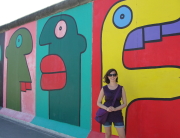Melissa is a 27-year old professional with a brand new job at a progressive organization. Instead of resigning herself to the land of the unemployed when she was unexpectedly laid off, she got busy on her job search and the intensive focus paid off.
Here are the secrets to Melissa’s success for landing this fantastic new job:
1. How long were you unemployed?
One month.
2. What was your job search strategy during this period?
The second I found out that I was losing my job, I went to work. I wrote an exit letter to all my professional contacts and friends and announced that I would be transitioning and was looking for jobs. I updated my LinkedIn profile, and intensely revised my resume based on solicited feedback from friends, family and mentors. I learned how to talk about my skill set and job experience in clear communicative terms that would help prospective employers consider me. I set up Idealist.org daily alert emails with wide job parameters, and started to identify possible positions that seemed appropriate. This was all within the first three days.
I work in a pretty small field where everyone knows everyone, and the job opportunities (especially for those without an advanced degree) are limited. I knew that I needed to act aggressively by using my contacts and network as best I could. I knew it wasn’t the time to dilly-dally. I was pretty sure that I didn’t want a break in my career and professional experience at this point, and was determined to make this bout of unemployment a brief blip. I thought that if I acted fast, I could minimize the amount of time that I spent waiting. I was very wary of the ramifications of being unemployed in this economy while trying to remain in my field.
I also had a clear idea of what I wanted from a job but I knew deep down that I was young enough in my career that I could be flexible and consider a variety of positions to get towards my professional goals. So I aimed for what I wanted, but also told myself to consider any job propositions. “Determined flexibility” was my motto.
3. How did you ultimately come to obtain your current new job? (Through a friend, cold application, etc.)
Early on in my search, I identified organizations where I would want to work, and then started to strategize. Did I know someone that worked there? Did I know someone who knew someone else? Could they nudge my resume along?
I also started searching for jobs. I found several positions on Idealist that seemed like a good fit, and also started hearing back from my mass email to friends and professional contacts. Several leads opened up (some were even not advertised publicly). I asked folks at my previous job to help nudge my resume along at all these prospects.
Within two weeks, I was interviewing for five positions at three different organizations. Within three weeks I had several offers, and at the end of the month, I had made my decision. I found out about my current job through a professional contact, from my mass “goodbye” email. I think I was brought to the interview stage because my mentors and colleagues were able to vouch for me (and because I had provided them with copies of my resume and what I was looking to do). It was a harried, scary, intense and quick experience to say the least, but I was able to get a job within four weeks, and actually make a wise choice. I was even able to squeeze in a mini vacation and work on my tan!
4. What do you think were the secrets to your success?
Networking, outreach, clear communication skills and determination.
5. What advice do you have for jobseekers out there?
Even when I was bored of job searching and my eyes hurt from looking at my resume on my computer, I tried to do at least one thing a day that was helping me find a job. But it was also important to take breaks from all this hunting – I met up with friends, took art classes and thought about planning a short vacation – but my focus for the month was to get a job.
I also realized how critical it was to know someone affiliated (in any way) with the place that you want to work with. Friends, friends of friends and informational interviews can open doors. It is, truly, about who you know. And if you don’t know people out in the field you want to work with – I bet you know someone who can introduce you to them.
My experience was unique because I was laid off, and I was forced to transition onto my new position as opposed to having the luxury to enter into it at my own pace. When you are unemployed, you have the time considerations, family obligations, economic hurdles and “gap on your resume” struggles that push you to hustle more. Having said that, you still need to network, hunt, consider and cast widely your net whether you are unemployed or just employed and looking for something new.
- Make sure your resume and cover letter are perfect.
- Don’t be afraid to ask people and solicit their advice.
- Is it clear what you did at your last job from your resume?
- Are you highlighting the ways you took initiative or worked beyond your job description in your cover letter?
- Did you read your cover letter out loud to check for mistakes?
- Are there activities that you’re doing outside of work that are still developing your skills and experiences, that might be attractive to an employer?
- If you don’t have experiences relating to the job you want to have, go out and volunteer during your free time.
- Clean up your facebook page and take down all those drunken photos.
- Make sure you adjust your privacy settings on your social networking so prospective employers won’t see inappropriate postings or photos.
- Get a LinkedIn profile, and make sure it corresponds with your resume.
- Have you reached out to your network (that means your friends, family and professional contacts) in a gracious and professional manner to let them know that you’re looking?
Good luck!
For help with your job search, see Love Your Job Search Class. June 2010 dates in NYC have just been announced.










Suzanne – thanks for including this here!
Melissa – congrats to you! I love the energy you used in your job search and especially how you did at least one thing each day. That momentum is key.
I wanted to add one more thing I noticed: you knew what you wanted! In my experience, that’s such a HUGE part of a successful job hunt. Do you agree that that helped you be so successful?
Best of luck in the new job!
– Jennifer